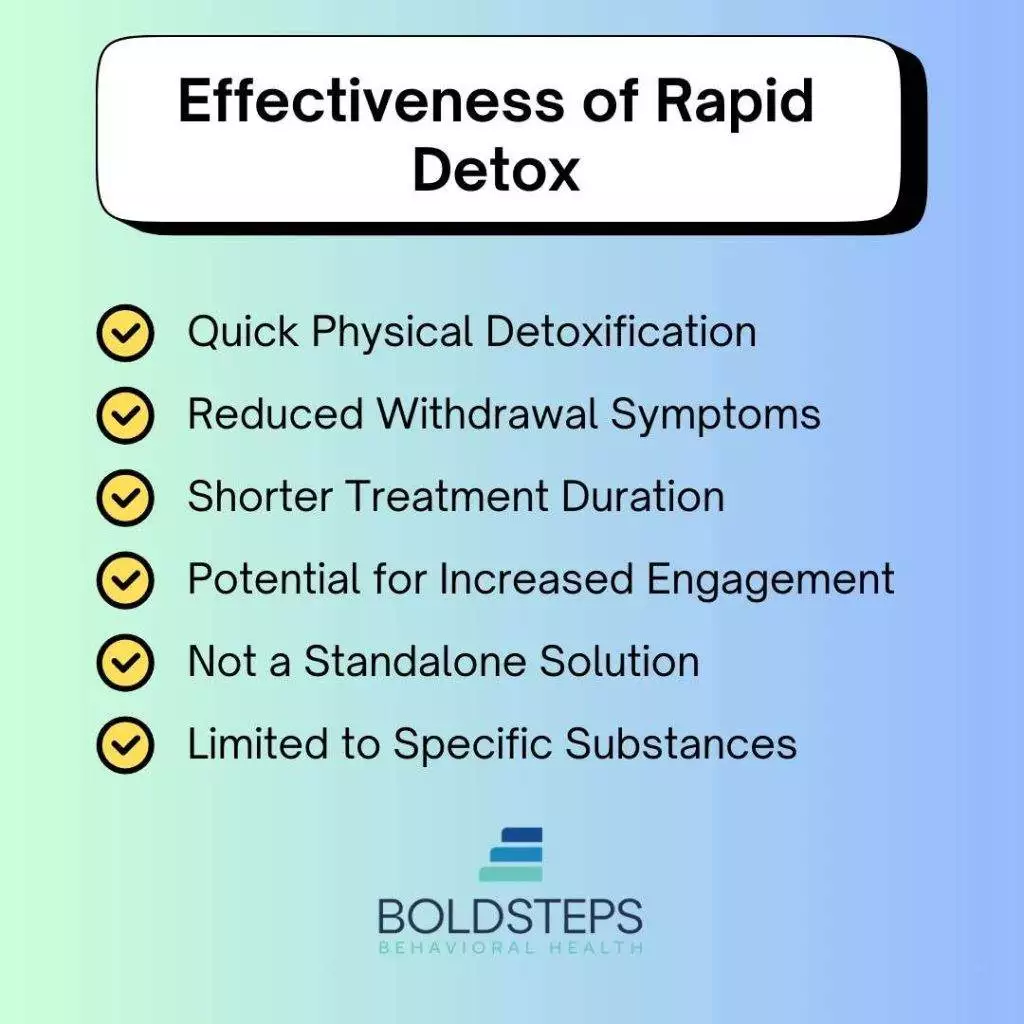Rapid detox, also known as anesthesia-assisted detoxification, is an accelerated method of cleansing the body from harmful substances such as opioids, alcohol, or benzodiazepines. Unlike traditional detox methods, which involve gradually tapering off substances while managing withdrawal symptoms, rapid detox involves sedating the patient under anesthesia and using medications to quickly remove drugs from the system. The goal is to speed up the withdrawal process and help individuals avoid the discomfort and pain associated with typical detox.
If you are dealing with a serious addiction, particularly to opioids or other physically addictive substances, detoxification is the first step toward recovery. While typical detox takes days or even weeks, some people prefer rapid detox as a faster option.
Well, this rapid detox program speeds up the detox process and shortens the time spent in withdrawal. But how successful is fast detoxification, needs a check.
So, join us on this post and understand what rapid detox is, its pros and cons, and the overall effectiveness of quick detox. Let’s go!
Rapid Detox: What it is?
Rapid detox is a medical process that clears the body of narcotics, particularly opioids, in significantly less time than typical detox methods. It frequently involves placing the patient under general anesthesia while drugs are delivered to hurry the detox process. By avoiding the extreme suffering of conscious withdrawal, the patient awakens with the majority of the drugs already out of their system.
This treatment is usually done in a hospital or specialist clinic under medical supervision. It normally lasts many hours, and patients wake up without the drug’s immediate effects. However, quick detox does not address the psychological components of addiction and is frequently followed by additional treatment or therapy.
Rapid detox is typically performed in a Medical Detox Center or hospital setting where the patient is carefully monitored to ensure safety. It is important to note that while the patient is sedated during withdrawal, they still experience the physiological effects, though they are unconscious during the process.
The Pros of Rapid Detox
1. Shortened Withdrawal Duration
Rapid detox condenses the withdrawal process, which can last days or even weeks in traditional detox, into a matter of hours. For individuals seeking a quicker resolution to physical dependency, this shorter time frame can be appealing, allowing them to move more quickly into addiction treatment programs, such as an Intensive Outpatient Program or an Outpatient Treatment Program.
The primary advantage of quick detox is its rapidity. Instead of going through a withdrawal period that might last days or even weeks, fast detox can cut the time to as little as 24-48 hours. For those who are afraid of the harsh and extended withdrawal symptoms associated with regular detox, rapid detox provides a faster solution.
2. Reduced Conscious Suffering
Withdrawal symptoms are one of the most feared aspects of detoxification, and rapid detox aims to minimize the physical and emotional distress that individuals experience during this process. Since the patient is sedated, they are not conscious of the nausea, body aches, cravings, and other symptoms typically associated with withdrawal.
3. Potential Gateway to Comprehensive Treatment
Rapid detox can serve as a preliminary step toward long-term recovery. By removing the physical dependence on substances quickly, individuals can proceed to the next phase of treatment, such as entering a Heroin Addiction Treatment Program, Benzodiazepine Addiction Treatment Program, or Alcohol Addiction Treatment Program. Once the body is cleared of harmful substances, clients may be better prepared to engage in therapy and recovery planning.
4. Appealing to Those Who Fear Withdrawal
Many individuals delay seeking treatment out of fear of withdrawal symptoms. For those who are particularly apprehensive about enduring a lengthy detox process, rapid detox can provide an expedited path to sobriety, making it more likely they will take the first step toward recovery.
The Cons of Rapid Detox
1. Significant Health Risks
Rapid detox is not without its dangers. The use of anesthesia and medications to accelerate detox carries inherent risks. Patients with underlying health issues, such as cardiovascular disease or respiratory problems, may face complications. Even in healthy individuals, the procedure can lead to adverse reactions, including heart attacks, respiratory distress, and even death in rare cases.
2. Limited to Opioid Detoxification
While rapid detox is primarily used for opioid addiction, it is generally not recommended for substances such as alcohol or benzodiazepines, which can cause severe withdrawal symptoms, including seizures and delirium tremens. For individuals addicted to these substances, a gradual, medically monitored detox at an Alcohol Detox Center or Drug Detox Center is safer and more effective.
3. Cost and Accessibility
Rapid detox is an expensive procedure and may not be covered by insurance. The cost can range from several thousand to tens of thousands of dollars. Additionally, not all medical centers offer rapid detox, meaning individuals may need to travel long distances to access this treatment.
Rapid detoxification is usually more expensive than traditional detox treatments. As it needs anesthesia, specialist drugs, and medical personnel, the cost can be prohibitively high for many people. Furthermore, insurance companies may refuse to cover quick detox since they consider it an experimental or hazardous technique.
4. Doesn’t Address Psychological Dependency
Detoxification, whether rapid or traditional, addresses only the physical aspect of addiction. Addiction, however, is a complex disorder that involves both physical and psychological dependence. Rapid detox may remove the drug from the body, but it does not provide the therapeutic tools needed to address the underlying psychological causes of addiction. Without follow-up care, such as counseling, therapy, and participation in an Intensive Outpatient Program or Dual Diagnosis program for co-occurring disorders, individuals are at high risk for relapse.
5. High Risk of Relapse
While rapid detox may cleanse the body of drugs, it does not guarantee long-term sobriety. Recovery is a process that requires ongoing commitment, therapy, and support. Without a structured treatment plan to address triggers, emotional challenges, and mental health issues, individuals who undergo rapid detox may relapse soon after the procedure.
Effectiveness of Rapid Detox
The effectiveness of quick detox is heavily dependent on the individual and how it is incorporated into a larger treatment plan. For some, quick detox can be an effective strategy for overcoming the physical challenge of withdrawal, allowing them to concentrate on the emotional and psychological parts of recovery.
However, it is crucial to understand that rapid detox is not a “quick fix” for addiction. While it may speed up the detoxification process, long-term rehabilitation necessitates comprehensive care, such as behavioral therapy, support groups, and lifestyle modifications.
At Bold Steps Behavioral Health, we understand that detox is only the first step in the recovery journey. While rapid detox may provide a quick solution for some, the key to long-term success lies in a comprehensive treatment approach that includes therapy, behavioral health support, and addressing co-occurring mental health conditions like Depression Treatment, Anxiety Disorder Treatment, or Psychological Trauma.
When is Rapid Detox Appropriate?
Rapid detox may be suitable for individuals who:
- Have a strong physical dependency on opioids such as heroin, fentanyl, or prescription painkillers.
- Are medically stable and can safely undergo anesthesia.
- Are looking for an expedited way to detoxify their body and are committed to following up with long-term treatment.
- Have already attempted traditional detox methods but found them too challenging to complete.
It’s essential that individuals considering rapid detox undergo a thorough medical evaluation to determine if they are good candidates for the procedure. At Bold Steps Behavioral Health, our Addiction Treatment Center in Pennsylvania offers comprehensive assessments and personalized treatment plans that prioritize both safety and effectiveness.
Alternative Detox Options
For those who are not good candidates for rapid detox, or who are dealing with substances like alcohol or benzodiazepines, traditional detox remains a highly effective and safer option. These programs typically involve medically supervised withdrawal in a Medical Detox Center, where patients receive 24/7 monitoring, medications to manage symptoms, and support through the withdrawal process.
Additionally, many individuals benefit from a Dual Diagnosis approach that addresses co-occurring mental health disorders, such as anxiety, depression, or PTSD. For those with multiple dependencies, tailored programs such as the Cocaine Addiction Treatment Program or Alcohol Addiction Treatment Program can provide the focused care needed to manage withdrawal safely and promote long-term recovery.
Looking for Professional Addiction Recovery Support? Call Bold Steps today!
At Bold Steps, we offer personalized addiction rehabilitation services to match your specific needs. Our experienced team of specialists is here to guide you through each stage of your recovery, providing a variety of treatments to help you reclaim control of your life. Whether you’re just starting or require ongoing support, our drug detox center is dedicated to guiding you down the path to long-term recovery.
We are committed to providing safe and effective detox and treatment options for individuals battling addiction. Whether rapid detox or a more gradual, medically supervised detox is appropriate, we offer comprehensive care plans that include post-detox treatment, such as participation in Intensive Outpatient Programs, therapy, and support for co-occurring disorders.
Conclusion
Rapid detox offers a quick, anesthetic-assisted method to detoxify the body from opioids and other drugs. While it presents several benefits, such as shortening withdrawal duration and reducing discomfort, it is not without its risks. The high cost, potential health complications, and the lack of psychological treatment make it an option that should be carefully considered and weighed against traditional detox methods. Take the first step toward recovery and contact us at (717) 896-1880 today.
FAQ on Rapid Detox
What is rapid detox?
Rapid detox is a medically supervised procedure where a patient is sedated, and medications are used to quickly remove addictive substances from the body. This process is designed to shorten the duration of withdrawal and reduce discomfort.
How long does rapid detox take?
The procedure itself lasts a few hours, though patients are often kept under observation for up to 24 hours. This shortens the detox process significantly compared to traditional methods, which can take days or weeks.
Is rapid detox safe?
While rapid detox is generally conducted in a medical setting, it carries risks, especially for individuals with underlying health conditions. Potential complications include heart problems, respiratory issues, and adverse reactions to anesthesia.
Who is a candidate for rapid detox?
Rapid detox is typically recommended for individuals with opioid addictions (like heroin or prescription painkillers) who are medically stable and can safely undergo anesthesia. It is not suitable for individuals detoxing from alcohol or benzodiazepines, as these require a more gradual approach.
What are the risks of rapid detox?
Risks include complications from anesthesia, adverse reactions to detox medications, and the potential for relapse if psychological support is not provided. Rapid detox does not address the emotional and mental health components of addiction.
Does rapid detox cure addiction?
No. Rapid detox addresses physical dependency, but addiction is a complex condition involving both physical and psychological factors. Detox is only the first step. Long-term recovery requires therapy, support, and treatment for any co-occurring mental health disorders.
Is rapid detox more effective than traditional detox?
Rapid detox can be effective for short-term physical detoxification, particularly for opioid addictions. However, it does not guarantee long-term sobriety. Traditional detox, followed by comprehensive treatment, is often more effective for sustained recovery.
What happens after rapid detox?
Following rapid detox, individuals are encouraged to enter a structured addiction treatment program, such as an Intensive Outpatient Program or a Dual Diagnosis program, to address the mental and emotional aspects of addiction and prevent relapse.





